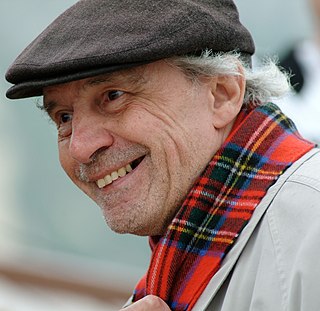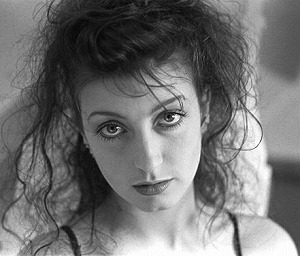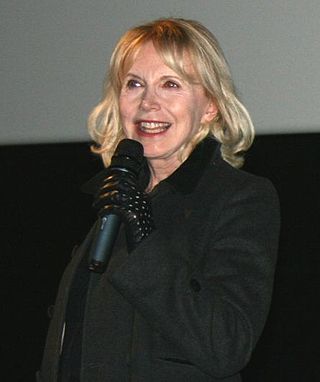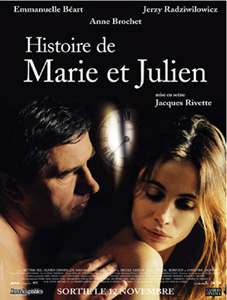The Prix Suzanne Bianchetti is an award in French cinema given annually since 1937 to the most promising young film actress.

Jacques Rivette was a French film director and film critic most commonly associated with the French New Wave and the film magazine Cahiers du Cinéma. He made twenty-nine films, including L'Amour fou (1969), Out 1 (1971), Celine and Julie Go Boating (1974), and La Belle Noiseuse (1991). His work is noted for its improvisation, loose narratives, and lengthy running times.

Barbet Schroeder is an Iranian-born Swiss film director and producer who started his career in French cinema in the 1960s, working with directors of the French New Wave such as Jean-Luc Godard, Jacques Rivette and Eric Rohmer.

Pascale Marguerite Cécile Claude Colette Nicolas, better known as Pascale Ogier, was a French actress. She won the Volpi Cup, and posthumously received a César Award nomination for her role in the 1984 film Full Moon in Paris.

Céline and Julie Go Boating is a 1974 French film directed by Jacques Rivette. The film stars Dominique Labourier as Julie and Juliet Berto as Céline.
L'Amour fou is a 1969 French romantic drama film directed by Jacques Rivette, who co-wrote the script with Marilù Parolini.

Bulle Ogier is a French actress and screenwriter.

Out 1, also referred to as Out 1: Noli Me Tangere, is a 1971 French mystery film written and directed by Jacques Rivette and Suzanne Schiffman. It is indebted to Honoré de Balzac's La Comédie humaine, particularly the History of the Thirteen collection (1833–35). Known for its length of nearly 13 hours, the film is divided into eight parts of approximately 90–100 minutes each.
William Lubtchansky was a French cinematographer.

Suzanne Schiffman was a French screenwriter and director for numerous motion pictures. She often worked with François Truffaut. The 'script girl' Joelle, played by Nathalie Baye in Truffaut's Day for Night was based on Schiffman. It accurately portrayed her close collaboration with Truffaut and other directors.

The Story of Marie and Julien is a 2003 drama film directed by Nouvelle Vague film maker Jacques Rivette. The film slowly develops from a drama about blackmail into a dark, yet tender, supernatural love story between Marie and Julien, played by Emmanuelle Béart and Jerzy Radziwiłowicz. Anne Brochet plays the blackmailed Madame X. Béart had previously worked with Rivette in La Belle Noiseuse, as had Radziwiłowicz in Secret Defense. The film was shot by William Lubtchansky, and edited by Nicole Lubtchansky, both frequent collaborators of Rivette's.

The Duchess of Langeais is a 2007 French-Italian period drama film directed by Jacques Rivette. Its original French title is Ne touchez pas la hache. It is based on the 1834 novel of the same name by Honoré de Balzac. The film stars Jeanne Balibar and Guillaume Depardieu as lovers in the 1820s, who are involved in a tormented and frustrating relationship.
Rendezvous at Bray is a 1971 French-Belgian drama film directed by André Delvaux and starring Anna Karina. It was entered into the 21st Berlin International Film Festival. Much of the film may be imagined by the characters and much is unexplained, leaving viewers to come up with their own interpretations.

Paulina is Leaving is a 1969 French drama film written and directed by André Téchiné, starring Bulle Ogier and Marie-France Pisier. It marked Téchiné's debut as a director. It remains Téchiné's less known film, since it was only very briefly released to theaters in 1975, six years after its premiered at the Venice Film Festival. It has neither rereleased nor ever transferred to video.
Nicole Lubtchansky was a French film editor who worked primarily with director Jacques Rivette. She edited twenty of Rivette's films, starting with 1969's L'amour fou and concluding with 2009's Around a Small Mountain. In between, Lubtchansky edited such acclaimed Rivette films as Celine and Julie Go Boating, Love on the Ground and La Belle Noiseuse.

This is a bibliography of articles and books by or about the director and film critic Jacques Rivette.
Jacques Rivette, le veilleur is a 1990 French television documentary film directed by Claire Denis and Serge Daney. Chronicling the life of film critic and director Jacques Rivette, it is an episode of the long running French TV show Cinéma, de notre temps, which profiles the lives of film directors. It was directed by Denis, with Daney acting as the interviewer. It was made in 1990and first broadcast on Arte on 24 February 1994. It is broken up into two parts: Le Jour and La Nuit.

Jacques Rivette was a French film director and film critic most commonly associated with the French New Wave and the film magazine Cahiers du Cinéma. He made twenty-nine films, including L'amour fou (1969), Out 1 (1971), Celine and Julie Go Boating (1974), and La Belle Noiseuse (1991). His work is noted for its improvisation, loose narratives, and lengthy running times.
Surreal Estate is a 1976 French mystery film directed by Argentine filmmaker Eduardo de Gregorio, who is best known for his screenwriting work with Jacques Rivette.












